Résultats de recherche de titre
Articles 1494381 à 1494400 sur 1497603
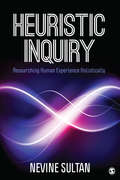
Heuristic Inquiry: Researching Human Experience Holistically
Par Nevine Sultan. 2019
Focused on exploring human experience from an integrative perspective, Heuristic Inquiry: Researching Human Experience Holistically presents heuristic inquiry as a unique…
phenomenologically aligned, experiential, and relational approach to qualitative research that is also rigorous and evidence based. The author describes a distinguishing perspective of this research that treats participants not as subjects of research but rather as co-researchers in an exploratory process marked by genuineness and intersubjectivity. Through the use of real-life examples illustrating the various processes of heuristic research, the book offers an understanding of heuristic inquiry that is straightforward and informal yet honors its creative, intuitive, and polydimensional nature. "A must-read for anyone interested in qualitative research." Graham Bright, York St John University, UK "This text provides a valuable service to novice and experienced researchers through its straightforward, yet complex and nuanced approach to heuristic inquiry." –Joseph McNabb, Northeastern University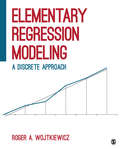
Elementary Regression Modeling: A Discrete Approach
Par Roger A. Wojtkiewicz. 2017
Elementary Regression Modeling builds on simple differences between groups to explain regression and regression modeling. User-friendly and immediately accessible, this…
book gives readers a thorough understanding of control modeling, interaction modeling, modeling linearity with spline variables, and creating research hypotheses that serve as a conceptual basis for many of the processes and procedures quantitative researchers follow when conducting regression analyses.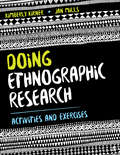
Doing Ethnographic Research: Activities and Exercises
Par Kimberly Kirner, Jan L. Mills. 2020
This workbook is loaded with exercises, how-to sections and checklists, all designed to serve as a supplemental support for students…
to apply the principles and concepts learned from the textbook it accompanies. With instructions and explanations written in a conversational style, it will help the student understand why the assignments are being used, why the skills they are developing are relevant and how the exercises relate to the textbook content.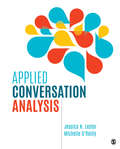
Applied Conversation Analysis: Social Interaction in Institutional Settings
Par Jessica Nina Lester, Michelle O′Reilly. 2019
Focusing on applied conversation analysis (CA), this timely book offers practical insights and guidelines for CA scholars studying social interactions…
in institutional settings. Written in an accessible style and packed with case studies, examples, activities, and practical tips, the book takes readers through the entire process of planning and carrying out an applied CA research study. By highlighting challenges, debates, and important questions, each chapter provides the theoretical foundation necessary for making informed decisions at every stage of a research project. The book is divided into three sections (context and planning, doing a project using conversation analysis, and disseminating your research) to mirror the research process.
Heuristic Inquiry: Researching Human Experience Holistically
Par Nevine Sultan. 2019
Focused on exploring human experience from an integrative perspective, Heuristic Inquiry: Researching Human Experience Holistically presents heuristic inquiry as a unique…
phenomenologically aligned, experiential, and relational approach to qualitative research that is also rigorous and evidence based. The author describes a distinguishing perspective of this research that treats participants not as subjects of research but rather as co-researchers in an exploratory process marked by genuineness and intersubjectivity. Through the use of real-life examples illustrating the various processes of heuristic research, the book offers an understanding of heuristic inquiry that is straightforward and informal yet honors its creative, intuitive, and polydimensional nature. "A must-read for anyone interested in qualitative research." Graham Bright, York St John University, UK "This text provides a valuable service to novice and experienced researchers through its straightforward, yet complex and nuanced approach to heuristic inquiry." –Joseph McNabb, Northeastern University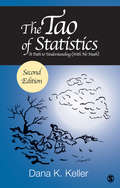
The Tao of Statistics: A Path to Understanding (With No Math)
Par Dana K. Keller. 2016
This Second Edition of The Tao of Statistics: A Path to Understanding (With No Math) provides a reader-friendly approach to…
statistics in plain English. Unlike other statistics books, this text explains what statistics mean and how they are used, rather than how to calculate them. The book walks readers through basic concepts as well as some of the most complex statistical models in use. The Second Edition adds coverage of big data to better address its impact on p-values and other key concepts; material on small data to show readers how to handle data with fewer data points than optimal; and other new topics like missing data and effect sizes. The book’s two characters (a high school principal and a director of public health) return in the revised edition, with their examples expanded and updated with reference to contemporary concerns in the fields of education and health.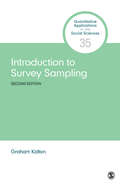
Introduction to Survey Sampling (Quantitative Applications in the Social Sciences #35)
Par Graham Kalton. 2021
Sample design is key to all surveys, fundamental to data collection, and to the analysis and interpretation of the data.…
Introduction to Survey Sampling, Second Edition provides an authoritative and accessible source on sample design strategies and procedures that is a required reading for anyone collecting or analyzing survey data. Graham Kalton discusses different types of probability samples, stratification (pre and post), clustering, dual frames, replicates, response, base weights, design effects, and effective sample size. It is a thorough revision and update of the first edition, published more than 35 years ago. Although the concepts of probability sampling are largely the same, there have been important developments in the application of these concepts as research questions have increasingly spanned multiple disciplines, computers have become central to data collection as well as data analysis, and cell phones have become ubiquitous, but response rates have fallen, and public willingness to engage in survey research has waned. While most of the volume focuses on probability samples, there is also a chapter on nonprobability samples, which are becoming increasingly important with the rise of social media and the world wide web.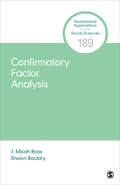
Confirmatory Factor Analysis (Quantitative Applications in the Social Sciences)
Par J. Micah Roos, Shawn Bauldry. 2022
Measurement connects theoretical concepts to what is observable in the empirical world, and is fundamental to all social and behavioral…
research. In this volume, J. Micah Roos and Shawn Bauldry introduce a popular approach to measurement: Confirmatory Factor Analysis (CFA). As the authors explain, CFA is a theoretically informed statistical framework for linking multiple observed variables to latent variables that are not directly measurable. The authors begin by defining terms, introducing notation, and illustrating a wide variety of measurement models with different relationships between latent and observed variables. They proceed to a thorough treatment of model estimation, followed by a discussion of model fit. Most of the volume focuses on measures that approximate continuous variables, but the authors also devote a chapter to categorical indicators. Each chapter develops a different example (sometimes two) covering topics as diverse as racist attitudes, theological conservatism, leadership qualities, psychological distress, self-efficacy, beliefs about democracy, and Christian nationalism drawn mainly from national surveys. Data to replicate the examples are available on a companion website, along with code for R, Stata, and Mplus.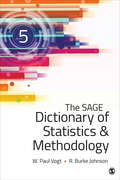
The SAGE Dictionary of Statistics & Methodology: A Nontechnical Guide for the Social Sciences
Par Robert Burke Johnson, W. William Vogt. 2016
Written in a clear, readable style with a wide range of explanations and examples, this must-have dictionary reflects recent changes…
in the fields of statistics and methodology. Packed with new definitions, terms, and graphics, this invaluable resource is an ideal reference for researchers and professionals in the field and provides everything students need to read and understand a research report, including elementary terms, concepts, methodology, and design definitions, as well as concepts from qualitative research methods and terms from theory and philosophy.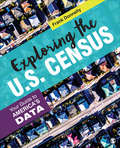
Exploring the U.S. Census: Your Guide to America’s Data
Par Francis P. Donnelly. 2020
Exploring the U.S. Census gives social science students and researchers alike the tools to understand, extract, process, and analyze data from…
the decennial census, the American Community Survey, and other data collected by the U.S. Census Bureau. Donnelly′s text provides a thorough background on the data collection methods, structures, and potential pitfalls of the census for unfamiliar researchers, collecting information previously available only in widely disparate sources into one handy guide. Hands-on, applied exercises at the end of the chapters help readers dive into the data. Along the way, the author shows how best to analyze census data with open-source software and tools. Readers can freely evaluate the data on their own computers, in keeping with the free and open data provided by the Census Bureau. By placing the census in the context of the open data movement, this text makes the history and practice of the census relevant so readers can understand what a crucial resource the census is for research and knowledge.
Doing Ethnographic Research: Activities and Exercises
Par Kimberly Kirner, Jan L. Mills. 2020
This workbook is loaded with exercises, how-to sections and checklists, all designed to serve as a supplemental support for students…
to apply the principles and concepts learned from the textbook it accompanies. With instructions and explanations written in a conversational style, it will help the student understand why the assignments are being used, why the skills they are developing are relevant and how the exercises relate to the textbook content.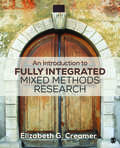
An Introduction to Fully Integrated Mixed Methods Research
Par Elizabeth G. Creamer. 2018
This practical book provides the tools needed to design, execute, and evaluate fully integrated mixed methods research studies. A uniting…
metaphor of the architectural arch helps students understand the benefits of a mixed methods approach as they consider ways to integrate the qualitative and quantitative strands at all stages of design and execution. With use of examples from popular media and published research, this text also includes a detailed discussion of ways to accomplish mixing methods during data collection and analysis and a separate chapter on designing and executing a realistic mixed methods dissertation.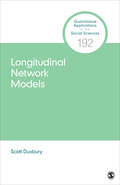
Longitudinal Network Models (Quantitative Applications in the Social Sciences)
Par Scott Duxbury. 2023
Although longitudinal social network data are increasingly collected, there are few guides on how to navigate the range of available…
tools for longitudinal network analysis. The applied social scientist is left to wonder: Which model is most appropriate for my data? How should I get started with this modeling strategy? And how do I know if my model is any good? This book answers these questions. Author Scott Duxbury assumes that the reader is familiar with network measurement, description, and notation, and is versed in regression analysis, but is likely unfamiliar with statistical network methods. The goal of the book is to guide readers towards choosing, applying, assessing, and interpreting a longitudinal network model, and each chapter is organized with a specific data structure or research question in mind. A companion website includes data and R code to replicate the examples in the book.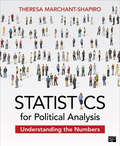
Statistics for Political Analysis: Understanding the Numbers
Par Theresa Marchant-Shapiro. 2015
Statistics are just as vital to understanding political science as the study of institutions, but getting students to understand them…
when teaching a methods course can be a big challenge. Statistics for Political Analysis makes understanding the numbers easy. The only introduction to statistics book written specifically for political science undergraduates, this book explains each statistical concept in plain language—from basic univariate statistics and the basic measures of association to bivariate and multivariate regression—and uses real world political examples. Students learn the relevance of statistics to political science, how to understand and calculate statistics mathematically, and how to obtain them using SPSS. All calculations are modeled step-by-step, giving students needed practice to master the process without making it intimidating. Each chapter concludes with exercises that get students actively applying the steps and building their professional skills through data calculation, analysis, and memo writing.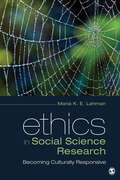
Ethics in Social Science Research: Becoming Culturally Responsive
Par Maria K. Lahman. 2018
Ethics in Social Science Research: Becoming Culturally Responsive provides a thorough grounding in research ethics, along with examples of real-world…
ethical dilemmas in working with vulnerable populations. Author Maria K. E. Lahman aims to help qualitative research students design ethically and culturally responsive research with communities that may be very different from their own. Throughout, compelling first person accounts of ethics in human research—both historical and contemporary—are highlighted and each chapter includes vignettes written by the author and her collaborators about real qualitative research projects.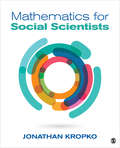
Mathematics for Social Scientists
Par Jonathan M. Kropko. 2016
Written for social science students who will be working with or conducting research, Mathematics for Social Scientists offers a non-intimidating…
approach to learning or reviewing math skills essential in quantitative research methods. The text is designed to build students’ confidence by presenting material in a conversational tone and using a wealth of clear and applied examples. Author Jonathan Kropko argues that mastering these concepts will break students’ reliance on using basic models in statistical software, allowing them to engage with research data beyond simple software calculations.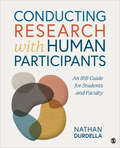
Conducting Research with Human Participants: An IRB Guide for Students and Faculty
Par Nathan Richard Durdella. 2023
Conducting Research with Human Participants: An IRB Guide for Students and Faculty by Nathan Durdella is the only guidebook students and…
faculty will need to navigate the IRB process and secure swift approval of research protocols. This book serves as an advisor to walk researchers through all the details of drafting, submission, and revision of materials for Institutional Review Boards so they can complete their research projects or dissertations faster. This text walks readers through the history of Institutional Review Boards, the contemporary context of ethical research, strategies to effectively draft, submit, and revise an IRB protocol, and guidance on working with an approved protocol in the field. The latest updates to the Common Rule and other regulatory frameworks, including special protections for working with vulnerable groups, are covered throughout the text. Not every research project goes according to plan, so adverse events and reporting receive special coverage. A final chapter on ethical research practices beyond IRB compliance encourages researchers to think through how to exit the field of research and ensure their research benefits the individuals, families, and communities in which they work. Take the guesswork out of the IRB process from start to finish with this handy guide.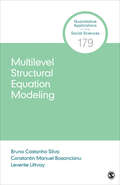
Multilevel Structural Equation Modeling (Quantitative Applications in the Social Sciences #179)
Par Levente Littvay, Bruno Castanho Silva, Constantin Manuel Bosancianu. 2020
Multilevel Structural Equation Modeling serves as a minimally technical overview of multilevel structural equation modeling (MSEM) for applied researchers and…
advanced graduate students in the social sciences. As the first book of its kind, this title is an accessible, hands-on introduction for beginners of the topic. The authors predict a growth in this area, fueled by both data availability and also the availability of new and improved software to run these models. The applied approach, combined with a graphical presentation style and minimal reliance on complex matrix algebra guarantee that this volume will be useful to social science graduate students wanting to utilize such models.
Confirmatory Factor Analysis (Quantitative Applications in the Social Sciences)
Par J. Micah Roos, Shawn Bauldry. 2022
Measurement connects theoretical concepts to what is observable in the empirical world, and is fundamental to all social and behavioral…
research. In this volume, J. Micah Roos and Shawn Bauldry introduce a popular approach to measurement: Confirmatory Factor Analysis (CFA). As the authors explain, CFA is a theoretically informed statistical framework for linking multiple observed variables to latent variables that are not directly measurable. The authors begin by defining terms, introducing notation, and illustrating a wide variety of measurement models with different relationships between latent and observed variables. They proceed to a thorough treatment of model estimation, followed by a discussion of model fit. Most of the volume focuses on measures that approximate continuous variables, but the authors also devote a chapter to categorical indicators. Each chapter develops a different example (sometimes two) covering topics as diverse as racist attitudes, theological conservatism, leadership qualities, psychological distress, self-efficacy, beliefs about democracy, and Christian nationalism drawn mainly from national surveys. Data to replicate the examples are available on a companion website, along with code for R, Stata, and Mplus.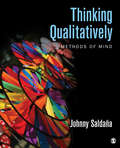
Thinking Qualitatively: Methods of Mind
Par Johnny Saldaña. 2015
Written in Johnny Saldaña′s elegant and accessible style, Thinking Qualitatively: Methods of Mind boldly pursues the challenge of teaching students…
not just how to collect and analyze data, but how to actively think about them. Each chapter presents one "method of mind" (thinking analytically, realistically, symbolically, ethically, multidisciplinarily, artistically, summarily, interpretively, and narratively), together with applications, a vignette or story related to the thinking modality, points to remember, and exercises. Designed to help researchers "rise above the data," the book explores how qualitative research designs, data collection, data analyses, and write-ups can be enriched through over 60 different lenses, filters, and angles on social life. Venturing into more evocative and multidimensional ways to examine the complex patterns of daily living, the book reveals how the researcher′s mind thinks heuristically to transcend the descriptive and develop "highdeep" insights about the human condition.